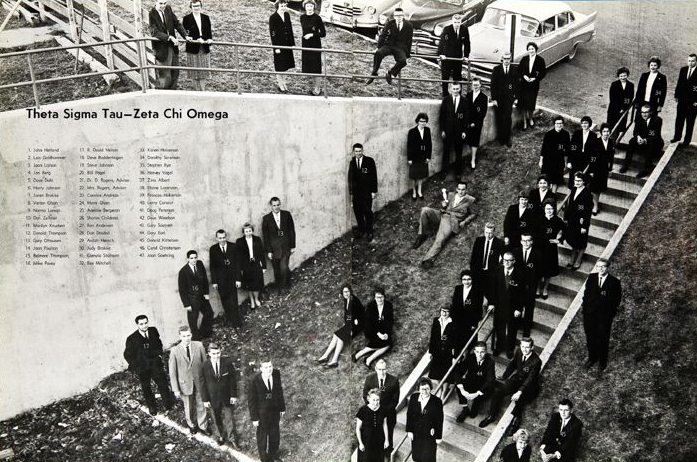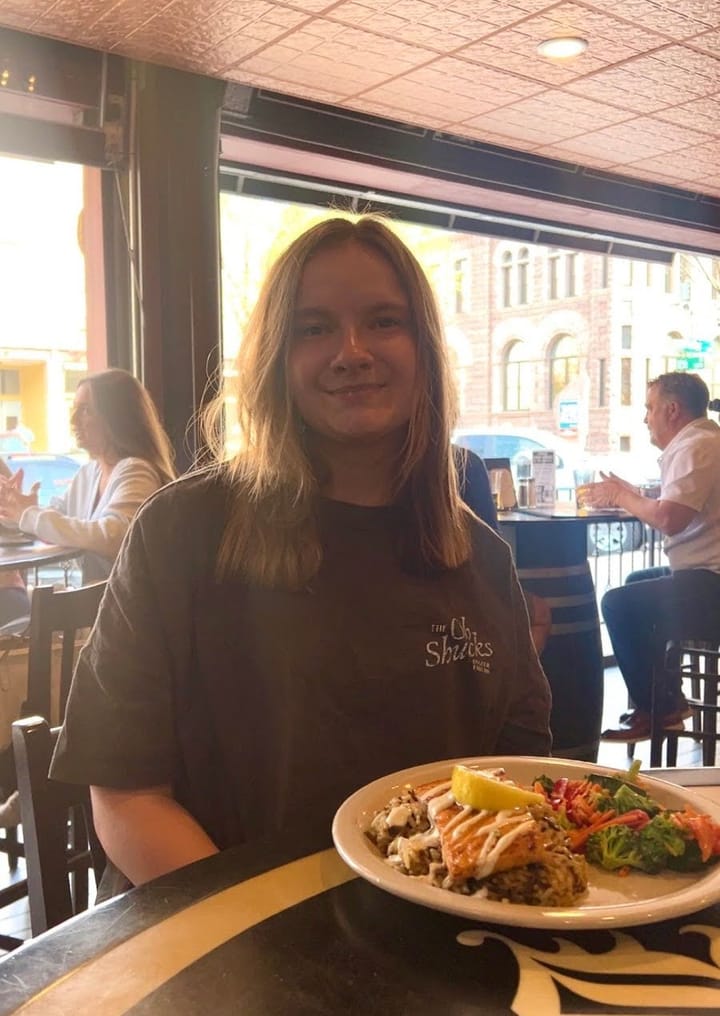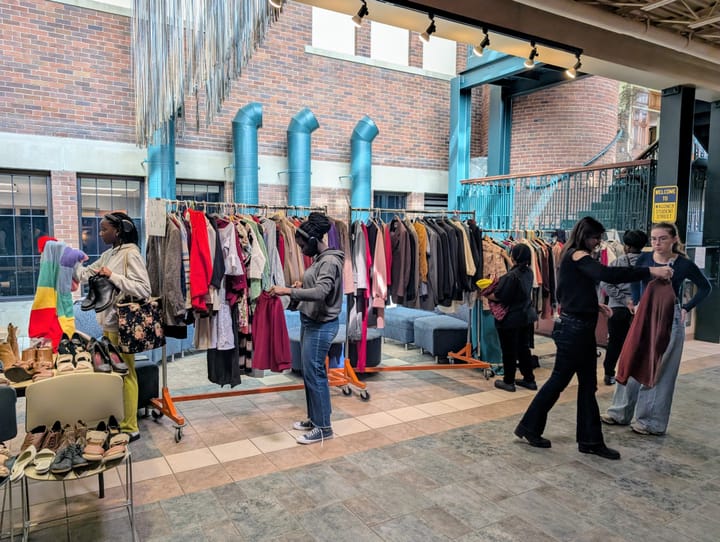Augustana's History with Societies Sparks Debate

On the front cover of an azure, pebbled-leather yearbook with white stripes dashed across the back, once-gold raised lettering now worn by the hands of nostalgia read “1961 Edda 100th Anniversary” in a bold, cursive font.
Sandra Looney, a graduate of the Augustana class of 1962, began teaching at Augustana in 1964 and retired in 2018. After 56 years at Augustana, she knows more about the history of Augustana than what can be found in a book.
As Looney turned each page of the yearbook, she gazed attentively upon the familiar faces and cherished friends of her junior year of college in 1961 — a time when Augustana had societies that were modeled after Greek fraternities and sororities. Looney said that Augustana created these alternatives to Greek societies because they “didn’t think they could meet a Greek standard.”
To identify regular students from those in societies, an observer only had to look at the distinct symbol prominently branded on their jackets.
"Everyone was wearing the jacket with the insignia, so you walked everywhere with your markings,” Looney said. “[The societies] all have reputations. They start to make distinctions. They’re not written, but it’s part of the code by which we live.”
Before their slow departure from Augustana campus culture — the last mention of the societies in the Edda yearbooks is the Alpha Delta Phi society in 1996, according to Collections Associate Elizabeth Cisar in the Center for Western Studies — there were eight societies, all of which held a specific place on the student social ladder.
Jefferson Michael, a recently elected Augustana Student Association (ASA) freshman senator, ran with a platform dedicated to bringing Greek life back to Augustana. He has already held a meeting with Dean of Students Beth Elam and would like to have one with President Stephanie Herseth Sandlin.
Others, such as Vedansh Ranot, an international student from India and NBA professional basketball player for India, ran for ASA and championed the prospects of adding Greek life to Augustana.
“It could be a positive environment for other students, but it's important that we maintain the decorum at Augie,” Ranot said.
Business and finance double major Michael believes that Greek life is something that will “eventually make its way to Augustana,” given that the university is aiming for a 3,000 plus undergraduate and graduate student body by 2030.
“Most of the time when you hear fraternities and sororities [it is] based on a bad perception of what a fraternity is. You think of the partying and alcohol, but we have a chance to fight against that,” Michael said.
Michael said that he and others have drafted a proposal that outlines the criteria both for accepting members and for regulating the chapter as a whole. He also said that he has not found a female student who would partner with him on the project to establish sororities.
“We're not working on [the plan] currently, but we’d start with fraternities,” Micheal said. “It requires a lot of funding and organizing, so we want to push to have a national chapter to come on campus and to help organize it.”
Although laws and regulations of fraternities are determined by the national chapter, Michael said that he wants to tailor the chapter to Augustana’s core values.
With an undergraduate student body of 2,390, some students, such as freshman Carmine Petersen, are concerned about the conflicts that the groups might bring to campus.
“It would divide those in sororities and fraternities and those who are not,” Petersen said. “It's already a small campus. There are opportunities for networking in Greek life, but a lot of Augustana's clubs have those opportunities. The opportunities for leadership within sororities and fraternities are exclusive to them. Once it's created, that's when the division starts.”
Liberal arts colleges, which typically have fewer than 5,000 students, are generally known for their smaller class sizes, which produces a culture that prioritizes meaningful discussion and academic enrichment.
Freshman Elsa Friesen said that the environment at Augustana seems to foster uniquely engaged students.
"There is a culture of partying here like every college campus, but people here will also say ‘let me tell you about what I am learning,’ or they will be passionate about one of their classes," Friesen said.
As a transfer student from the University of Nebraska-Lincoln, Friesen became very familiar with the effect Greek life has on a student body and campus community.
"Initiations and hazing are a huge part of the Greek life culture, and it's not safe,” Friesen said. "I do not believe the people at Augustana and our culture would go to extremes, but people do things in groups that they would never do alone."
The Jed Foundation, an organization dedicated to protecting young adult mental health, conducted a 2024 data and literature analysis on the influence of Greek life on college campuses. They found that fraternity culture in particular promoted sexual assault, hazing and heavy drinking, as well as substance use; this issue affected not only members of a frat but the collective campus. In conjunction, sorority members were found to be more likely to be stalked, assaulted or become victim to assault and emotional abuse. Sage Journal reported that 87% of fraternities' constituents reported both binge drinking and being more likely to commit assault while under the influence.
However, Ann Kolbrek, assistant director of the Student Success Center, had an enriching and enlightening experience with Greek life. Kolbrek attended a small liberal arts college not unlike Augustana. As a legacy student at the University of the South in Sewanee, Tennessee, that “sits on the Cumberland Plateau with one blinking stop light,” she joined the Phi Kappa Epsilon sorority and remained a member throughout her college years.
Though Kolbrek’s university had both national and local Greek life chapters, students had limited access to “the outside world,” as Kolbrek put it, due to the school's geographic location and population. In fall 2023, the University of the South had an undergraduate enrollment of 1,615 compared to Augustana’s 1,871.
“The community was the most important quality that I experienced,” Kolbrek said. “You had people in a small, small community that were really willing to show up for each other. But I also think the same sense of community and opportunities to create that sense of community would still be there if I had not been involved in Greek life.”
For some students, like freshman Sam Makram, clubs and the events they host are an integral part of Augustana experiences.
“Augustana has a lot of strong clubs on campus like intramurals, UBG and ASA that hold events for students to attend,” Makram said. “That's what makes Augie, Augie — because of the community and the people who show up for events.”
Although Jefferson Michael remains eager to implement fraternities at Augustana, he isn’t willing to do it without support from the community.
“If people are not receptive to the idea of Greek [life] at Augustana, then we wouldn’t go forward with it,” Michael said. “We wouldn’t want to force it.”
The question of whether Augustana should support Greek life remains as important today as when Sandra Looney was in school.
Looney transferred to Augustana as a junior and was inducted to the Philomathian Websterians, a group of jocks and regular students that fell in the middle of the pecking order — once banned for a fleeting moment due to an incident involving spaghetti thrown onto dining hall windows.
“I had fun in the Philo Methians, and I was proud of it,” Looney said of her time as a society member. “There is bonding, but overall we’re a small campus. Isn’t there any other ‘something else’ that would not invoke hierarchies?”
Despite her nostalgia for her college years, Looney remains hesitant about whether the return of societies or Greek life would be wise for a modern-day Augustana.
“I think it would reinforce things Augie is lucky to be free of,” Looney said.
On a recent rainy morning in April, Looney flipped through the pages of her robust yearbook. She turned to a page that pictured the Theta Sigma Tau society, lounging leisurely on the stairs on the western side of the former football stadium — the same place where the Morrison Commons now stand and where Looney sat, retelling the stories of Augustana societies past.
“We have to ask, what will we get from it?” Looney said. “And do we need it?”



